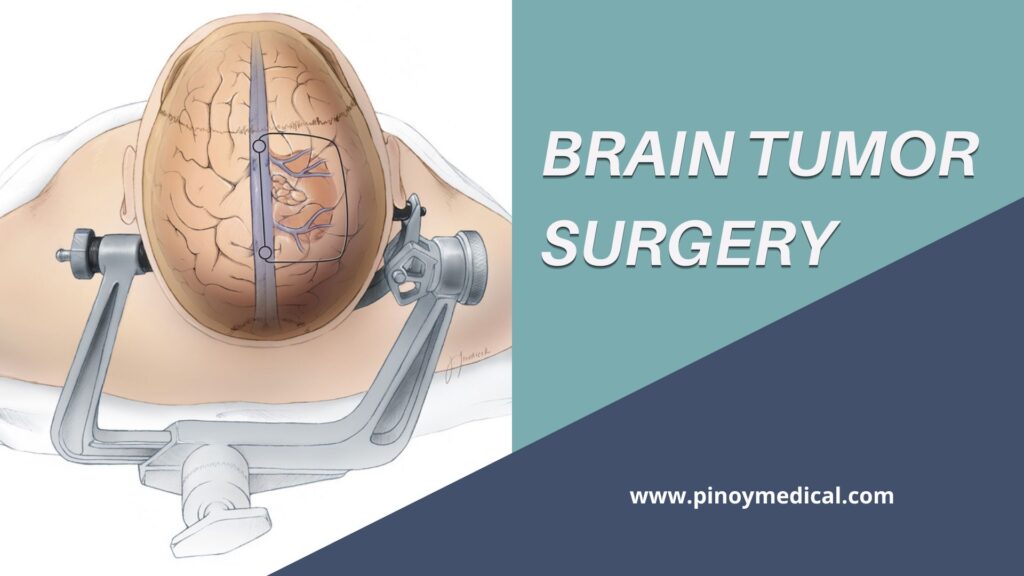Brain tumor surgery is the excision of aberrant brain cell proliferation. Its objectives are to increase the probability of survival, stop new tumors from developing, and relieve symptoms. The treatment of normal and aggressive tumors is the same process. Advantages include decreased symptoms, better neurological function, and increased patient quality of life, all of which promote long-term medical results.
Brain Tumor Surgery Price
Hospital brain tumor surgery expenses can range from ₱200,000 to ₱1,000,000 and more, depending on the type of procedure and surgical difficulty. Patients holding HMO cards may be eligible for cost savings, and PhilHealth covers a portion of some costs. For bundled services, hospitals frequently provide packages or discounts. To determine exact costs, it is best to speak with local healthcare providers directly, taking into account differences in price and available funding.

Popular Hospitals and Clinics that Offer Brain Tumor Surgery
Hospitals’ rates for brain tumor surgery vary depending on several variables, including the hospital’s reputation, where it is located, and the range of extra services offered before, throughout, and following the procedure. In general, government-run healthcare facilities charge less. Contemplate well-known clinics that specialize in brain tumor surgery are shown below.
| Hospitals/Lab | Location | Contact | |
| The Medical City | Ortigas Avenue 1605 Pasig | 0289881000 | [email protected] |
| Makati Medical Center | Amorsolo Street, corner Dela Rosa Street 1229 Makati | (02) 88888999 | [email protected] |
| Veterans Memorial Medical Center | M24R+C2V, North Ave, Diliman, Quezon City, Metro Manila | (02) 89276426 | [email protected] |
| St. Lukes Medical Center | 279 E Rodriguez Sr. Ave,Quezon City Rizal Drive cor. 32nd St. and 5th Ave Taguig City | +63287230101 +63287897700 | [email protected] [email protected] |
| Philippine General Hospital | HXHP+469, Taft Ave, Ermita, Manila, 1000 Metro Manila | +63285548400 local 2538 / 2539 | [email protected] |
| Cardinal Santos Medical Center | Osmeña Blvd, Cebu City, 6000 Cebu | (032) 2537512 | [email protected] |
| Cebu Doctors University Hospital | Ortigas Avenue 1605 Pasig | 0289881000 | [email protected] |
| Bulacan Medical Center | 99 Potenciano Street, Malolos, Bulacan 3000 Malolos | 09918537331 | [email protected] |
| Quirino Memorial Medical Center | JP Rizal cor. P. Tuazon Sts, Project 4, Quezon City, Philippines, 1109 1109 Quezon City | 0253049800 | [email protected] |
| Healthway QualiMed Hospital San Jose del Monte | Altaraza Spine Road, Barangay Tungkong Mangga 3023 San Jose del Monte | (044) 3070000 | [email protected] |
Video about Brain Tumor
FAQs
How can I tell whether I require surgery for a brain tumor?
Surgery for a brain tumor may be advised by your doctor depending on the tumor’s dimensions, position, and kind as well as your general health and complaints. Diagnostic imaging tests such as CT or MRI scans are helpful,
What amount of time does surgery usually take for brain tumors?
The quantity, the spot, and the intricacy of the tumor all affect how long surgery takes. A few hours can be all that a surgery takes, or several hours.
What dangers come with having a brain tumor surgically removed?
Hazards encompass infection, hemorrhage, harm to the adjacent brain tissue, neurologic deficiencies, and anesthesia-related issues. The position and dimensions of the tumor are two criteria that affect how serious the hazards are.
How long does it take to recover from brain tumor surgery?
Everybody recovers differently, but generally speaking, recovery entails a hospital stay accompanied by some downtime at home. It could need both vocational and physical therapy to reclaim functionality and strength.
Will there be any discomfort during or following the procedure?
To make sure you don’t feel discomfort during brain tumor surgery, anesthesia is employed. Painkillers are given to patients following surgery to help with discomfort throughout the healing process.
Will I require further care following surgery for a brain tumor?
Additional therapies including radiation therapy, chemotherapy, or targeted medication therapy may be suggested to control residual tumor cells or prevent a recurrence, depending on the kind and grade of the tumor.


